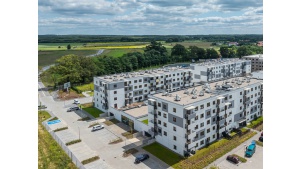Workplace revolution
Challenges associated with remote working are encouraging employees to return to the office, but the office as we know has changed, or at least should change. This is one of the conclusions drawn from a webinar with expert panelists organized by Mindspace titled “Workplace Revolution.” What is the role of the office in the new hybrid world, and how must it change to meet new expectations? These questions and more were central during the webinar led by: Anna Jarzębska, psychologist and career mentor; Karina Kreja, International Concept Manager and Next Office & Workplace Expert at Kinnarps; Jowita Michalska, founder and CEO of Digital University; and Ula Zając-Pałdyna, HR specialist and founder of the HRnaobcasach.pl blog.
‘Workplace Revolution’ addressed the new needs and expectations of employees and employers after a long period of remote work and work-from-home. While the latter has proven to be productive and effective, employees do want to return to the office as they miss the social aspect of their professional life. Employers understood the importance of flexibility and trusting their employees ‘remotely’, but struggled to keep company culture alive. The hybrid model has gained in importance.
“The hybrid work model always worked, especially well for companies leasing flex space, but today it is also popular among businesses that preferred traditional offices up till now,” said Efrat Fenigson, VP Marketing at Mindspace, opening the debate. “Not only does a hybrid work model offer a choice of where, when and how you work, but it also helps to attract new talent to an organization and retain existing employees who value flexibility. Studies by Harvard Business Review have shown that frequent in-person interactions lead to commitment, support, and better cooperation among people on teams. So there’s no denying that despite the numerous advantages of remote working, it remains a challenge, among other things, for maintaining interpersonal relationships and ensuring well-being, especially for employees who may experience burnout as a result of working from home.”
The panelists predict that hybrid work will stay with us for a long time, and it will lead to new models of work and leadership. Anna Jarzębska said that: “recently soft skills (such as empathy and the ability to listen to each other) have become more and more important, and hybrid work requires even greater involvement of line managers towards their employees.” This is one of the reasons why, as Ula Zając-Pałdyna said, “before companies make a decision to return to the office, they must follow a properly planned communication strategy in this respect. The success of any organization depends on its employees, hence their needs and preferences are of great significance.”
Jowita Michalska added that: “in the new hybrid world, we should act according to the principle of Trust–Agility–Experimenting. Working in this system is best learned through experience, while taking advantage of the rich and widely available offer of technical and IT solutions. Technological advancements have accelerated tremendously in recent years, thus changing not only the work environment but also every other area—health, personal life, and business alike.”
Karina Kreja suggests, the old patterns of workplaces are no longer valid. These days, employers should provide their team with an office oriented not only towards amenities and ergonomics, but also towards flexibility. Strategic decisions in this area should be made by organizations now, since they will have to offer incentives to their employees for returning to the office. The office will have to compete with working from home or from other places, under the format of ‘work from anywhere’.
The panelists unanimously agreed the role of offices is constantly evolving. Where once (not so long ago) they were a ‘place you go to for performing professional tasks’, today they have to serve so many other purposes. Above all, a modern workspace should be a place of interaction and inspiration that fosters creativity and helps establish relationships with both clients and the team. In addition, the office can be used as a tool to help build and maintain the corporate culture of companies.
Michał Kwinta, Senior Community Manager at Mindspace Koszyki in Warsaw, moderator of the debate, said: “Based on my observations, I have seen that many businesses are keen to have a space at their disposal that serves to build the unique character of the organization while positively impacting how people work, develop and innovate. From the very beginning, the intention of Mindspace has been that the design, functional interiors, as well as a personalized level of service, should enhance a strong sense of community, while offering a professional and top-quality workspace. I’m convinced that this is why so many companies have chosen to tie their future to Mindspace—both before and during the pandemic. A high-quality, well-managed, flexible workplace helps establish a coherent and distinct identity for any company.”
The “Workplace Revolution” debate was organized by Mindspace, a global operator of boutique, flexible office spaces for companies of all sizes, which currently has a total of 32 locations in Europe, the United States and Israel.

Deweloperzy ukrywają ceny mieszkań. Z troski o klientów czy swoje portfele?

Więcej przestrzeni, mniej hałasu – dlaczego Polacy coraz częściej wybierają przedmieścia?

Jak czytać rzuty mieszkań i uniknąć przykrych niespodzianek? AI ułatwia wybór
Więcej ważnych informacji
 Jedynka Newserii
Jedynka Newserii

 Jedynka Newserii
Jedynka Newserii

Handel

Polskie MŚP otrzymają większe wsparcie w ekspansji międzynarodowej. To cel nowej inicjatywy sześciu instytucji
Firmy z sektora małych i średnich przedsiębiorstw otrzymają kompleksowe wsparcie na potrzeby zwiększania konkurencyjności na arenie międzynarodowej. Taki jest cel wspólnej inicjatywy instytucji zrzeszonych w Grupie PFR pod szyldem Team Poland. Obejmuje ona zarówno wsparcie kapitałowe, w postaci gwarancji, pożyczek czy ubezpieczenia, jak i doradztwo oraz wsparcie promocyjne i informacyjne, dzięki czemu mikro-, małym i średnim firmom łatwiej będzie podjąć decyzję o ekspansji zagranicznej. Pierwszy projekt dotyczy wsparcia dla firm zainteresowanych uczestnictwem w odbudowie Ukrainy.
Bankowość
RPP zgodna co do potrzeby obniżania stóp procentowych. Trwają dyskusje dotyczące tempa tych decyzji

W lipcu Rada Polityki Pieniężnej po raz drugi w tym roku obniżyła stopy procentowe, określając swój ruch mianem dostosowania. W kolejnych miesiącach można oczekiwać kolejnych obniżek, ale ich tempo i termin będą zależeć od efektów dotychczasowych decyzji i wzrostu płac. Docelowo główna stopa procentowa ma wynosić 3,5 proc. Te okoliczności sprzyjają kredytobiorcom.
Handel
Umowa z krajami Mercosur coraz bliżej. W. Buda: Polska nie wykorzystała swojej prezydencji do jej zablokowania

– Polska podczas prezydencji w Radzie UE nie wykorzystała szansy na obronę swoich interesów w sprawie umowy z krajami Mercosur – ocenia europoseł PiS Waldemar Buda. W jego ocenie polski rząd, mimo sprzeciwu wobec zapisów umowy, nie zbudował w UE sojuszy niezbędnych do jej odrzucenia. Porozumienie o wolnym handlu spotyka się przede wszystkim z protestami europejskich rolników, którzy obawiają się zalania wspólnego rynku tańszą żywnością z krajów Ameryki Południowej. Według europosła wszystko może się rozegrać w najbliższych tygodniach.
Partner serwisu
Szkolenia

Akademia Newserii
Akademia Newserii to projekt, w ramach którego najlepsi polscy dziennikarze biznesowi, giełdowi oraz lifestylowi, a także szkoleniowcy z wieloletnim doświadczeniem dzielą się swoją wiedzą nt. pracy z mediami.




![Część środków z Planu Społeczno-Klimatycznego trafi na walkę z ubóstwem transportowym. Organizacje branżowe apelują o zmianę priorytetowych projektów [DEPESZA]](https://www.newseria.pl/files/1097841585/rower3,w_85,_small.jpg)




.gif)

 |
| |
| |
|